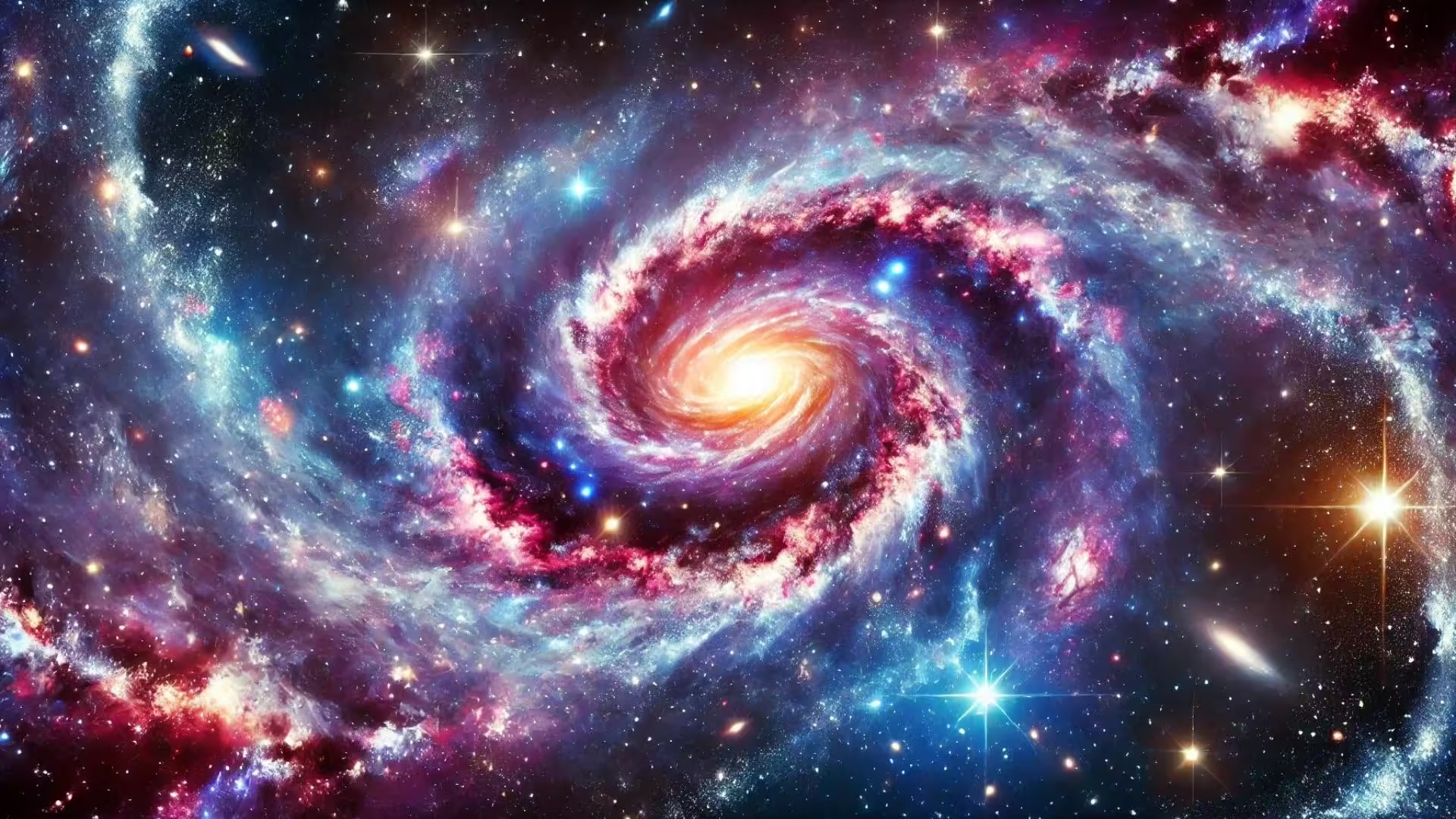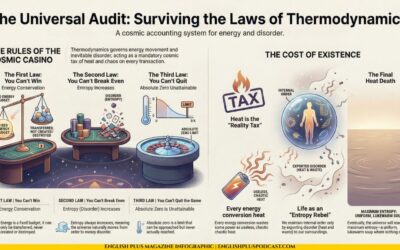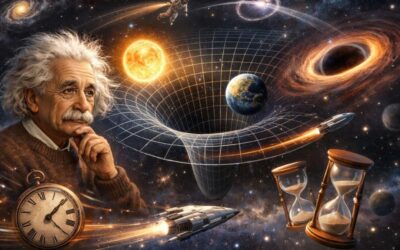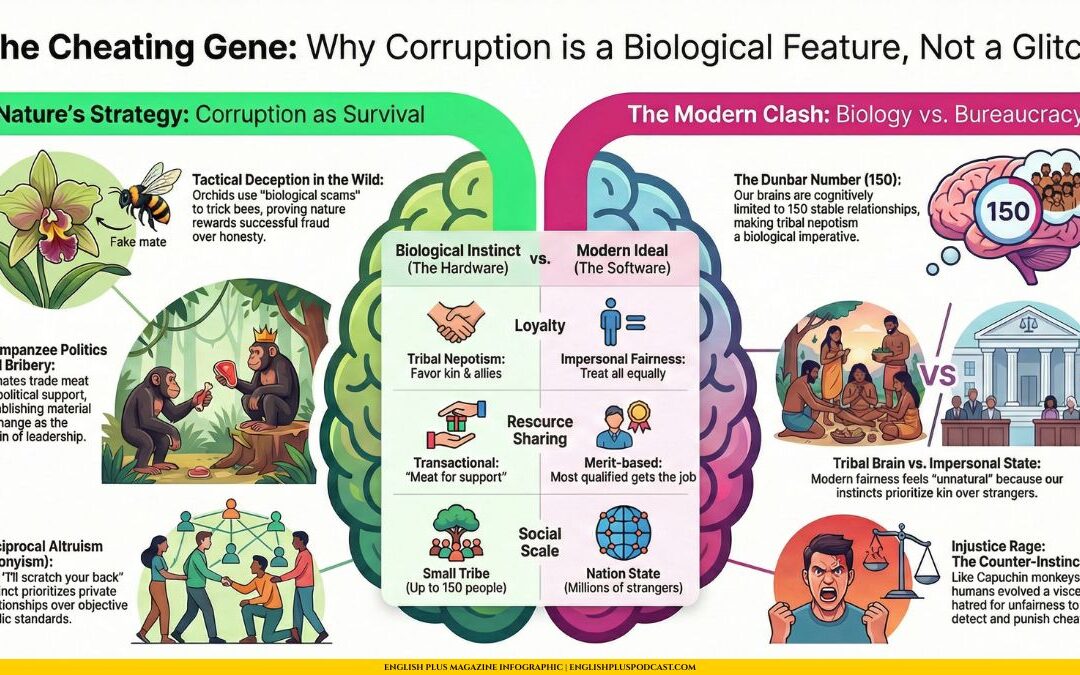- The Gist
- How Did We Discover the Expanding Universe?
- The Big Bang: The Start of It All
- How Do We Know the Universe is Still Expanding?
- Why Does the Expanding Universe Matter?
- Real-Life Connections: The Expanding Universe and Everyday Life
- Take Action: Stay Curious, Keep Exploring
- Expand Your Vocabulary
- Let’s Talk
- Quiz
The Gist
Imagine standing on a giant trampoline. If you drop a few marbles onto it and start pulling the edges, what happens? The marbles begin to spread farther apart from each other. That’s a simplified way of understanding how our universe works—it’s constantly expanding, with galaxies moving away from each other like those marbles. But how do we know this is happening? Why is it important? Let’s dive into the scientific evidence that tells us our universe is growing and explore why this discovery is a game-changer for how we understand everything around us.
How Did We Discover the Expanding Universe?
For a long time, scientists believed that the universe was static—neither growing nor shrinking. Then, in the 1920s, American astronomer Edwin Hubble made a groundbreaking observation. He discovered that distant galaxies were moving away from us, and the farther away they were, the faster they seemed to be receding. This was shocking at the time but led to the conclusion that the universe itself was expanding.
Hubble’s discovery was based on something called redshift. When light from a galaxy stretches as it moves away from us, it shifts toward the red end of the spectrum, much like how the sound of a car engine fades as it drives away. By measuring the amount of redshift, Hubble could determine how fast a galaxy was moving and in what direction. This observation was the first solid proof that the universe isn’t fixed—it’s growing.
The Big Bang: The Start of It All
The concept of the expanding universe ties directly into the Big Bang Theory. According to this theory, the universe started from a single point, a tiny, hot, and incredibly dense singularity, about 13.8 billion years ago. From this initial explosion, space itself began to expand. As it did, matter cooled and formed the stars, galaxies, and planets we see today.
Think of the universe like a balloon. When you blow air into it, the surface (representing space) stretches and everything on that surface (representing galaxies) moves farther apart. The fact that we see galaxies moving away from us suggests that the universe has been expanding since its very beginning.
How Do We Know the Universe is Still Expanding?
One of the most crucial pieces of evidence supporting the idea that the universe is still expanding comes from observations of cosmic microwave background radiation (CMB). This is the afterglow of the Big Bang, a kind of faint energy spread across the universe. By studying the CMB, scientists can understand the early conditions of the universe and track its growth over time.
Another way scientists measure the expansion is through supernovae—the explosive deaths of massive stars. These events are so bright that they can be seen from billions of light-years away. By studying these distant supernovae, scientists realized that the universe isn’t just expanding—it’s expanding at an accelerating rate, which was another astonishing discovery.
Why Does the Expanding Universe Matter?
You might be wondering, “Why does it matter if the universe is expanding?” Well, the growth of the universe has major implications for understanding our place in it and its future. For one, it suggests that the universe is dynamic and constantly changing, just like everything else in nature.
It also forces us to confront the possibility that the universe could have an end. If the expansion continues to accelerate, the universe could eventually reach a state known as the “Big Freeze,” where galaxies drift so far apart that stars burn out, and everything cools down to near absolute zero. Alternatively, some theories suggest the universe could eventually collapse back in on itself in a “Big Crunch.” These are just possibilities, but they highlight how understanding the expanding universe gives us clues about what the distant future holds.
Real-Life Connections: The Expanding Universe and Everyday Life
At first glance, the expanding universe might seem like a distant and abstract concept, but it has practical implications for life here on Earth. For example, GPS satellites, which help us navigate, need to account for the effects of general relativity—the theory that explains how gravity works on large scales, including the expanding universe. Without these adjustments, your smartphone’s map app wouldn’t be as accurate.
Moreover, the more we understand about the universe’s expansion, the better we get at answering the fundamental questions: How did we get here? Where are we going? Are we alone? The study of the expanding universe pushes the boundaries of human knowledge and encourages scientific innovation across many fields.
Take Action: Stay Curious, Keep Exploring
The universe is vast, and its expansion is one of the most profound discoveries we’ve made about it. It’s a reminder that our world is part of something much larger, constantly changing and evolving. So, what can you take from this? Stay curious. Whether it’s learning more about the cosmos or exploring new ideas in your own life, embrace the unknown and let it inspire you.
As you go about your day, think about the universe’s constant growth. Just like the cosmos, our understanding of the world and ourselves is always expanding. Keep learning, keep questioning, and let your curiosity about the universe push you toward new discoveries in your own life.
Expand Your Vocabulary
- Redshift: This refers to the way light stretches as objects in space move away from us, shifting towards the red end of the spectrum. In everyday conversation, you might use “redshift” metaphorically to describe something moving away or distancing, like “Our plans for the weekend seem to be redshifting as people cancel.”
- Big Bang Theory: The scientific theory that explains how the universe began from a single point and expanded outward. In daily life, you might use it when referring to a major starting point, like “Our company’s growth is like the Big Bang—we started small but are expanding fast.”
- Cosmic Microwave Background Radiation (CMB): The faint energy left over from the Big Bang, spread across the universe. You might compare it to something that leaves a lasting trace, like “The decision left a cosmic microwave background in our department—we’re still feeling the effects.”
- Supernova: The explosive death of a star. You could use this term to describe something that has a massive impact, like “Her performance was a supernova—it completely blew everyone away.”
- Expansion: In the context of the universe, this refers to how galaxies are moving farther apart as space itself grows. In everyday language, you might say, “The expansion of our project has brought new opportunities but also new challenges.”
- Singularity: A point where matter is infinitely dense, such as the beginning of the universe. You can use it metaphorically, like “This problem is the singularity of our project—it’s where everything started to change.”
- Acceleration: This refers to the increasing rate at which the universe is expanding. In real life, it’s often used to describe a quickening pace, like “The acceleration of technology has been incredible in the past decade.”
- Relativity: Refers to the theory by Einstein that explains how space, time, and gravity work on large scales. You might use it to talk about perspective, like “In relativity, what seems big to you might be small to someone else.”
- Big Freeze: A theoretical future where the universe keeps expanding, and everything cools down to near absolute zero. You can use this figuratively to describe the end of a process, like “The project has entered its Big Freeze—no more changes, and things are cooling off.”
- Hubble’s Law: The observation that galaxies are moving away from us, and the farther they are, the faster they’re receding. In conversation, you might say, “Like Hubble’s Law, the further apart we are, the more distance grows between us.”
Let’s Talk
- How does the idea of the universe constantly expanding change your perspective on time, space, or even your place in the world?
- The concept of redshift helps us measure how fast galaxies are moving away. What are some ways we can measure changes or distance in our personal lives?
- The universe’s expansion started from a singular point and continues today. Can you think of a time when something in your life started small but grew in unexpected ways?
- The Big Freeze is one possible future for the universe, where everything cools down. Do you think it’s important to always be moving and expanding, or is there value in things slowing down sometimes?
- Just like scientists explore the expanding universe to understand our origins, how do you explore or reflect on your personal growth and the “expansion” of your life?










0 Comments